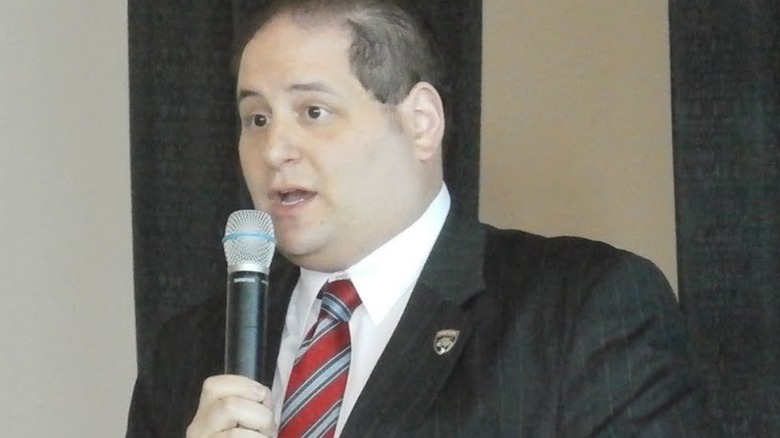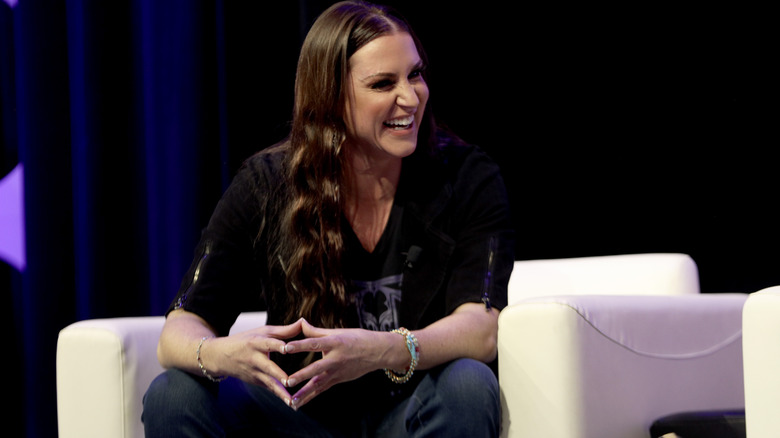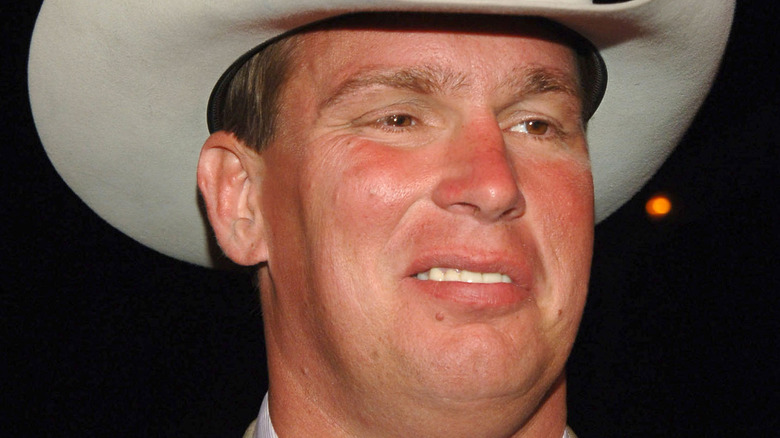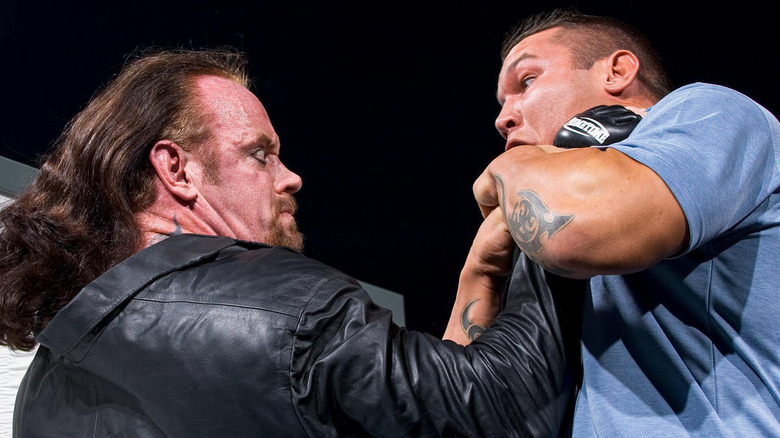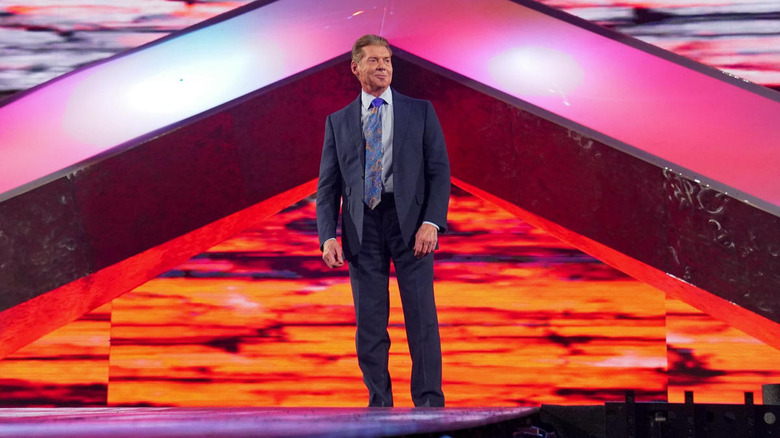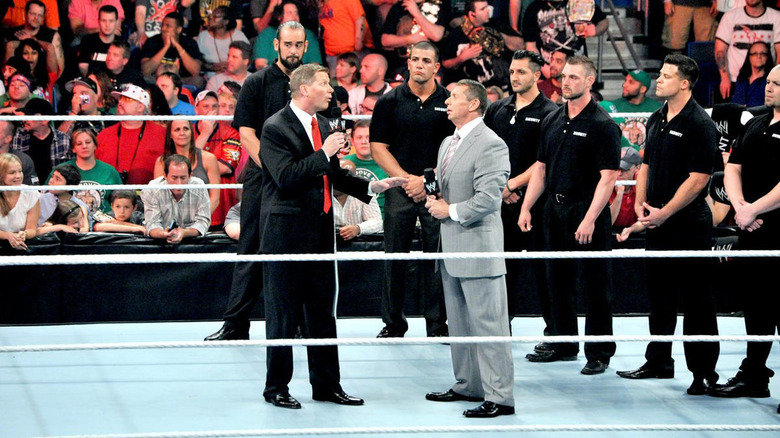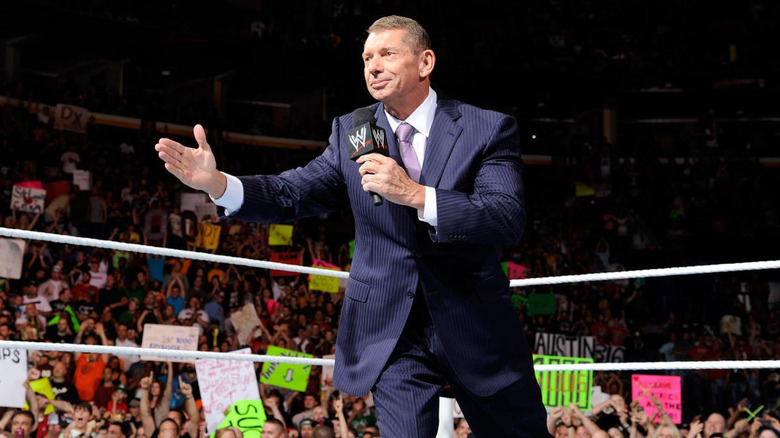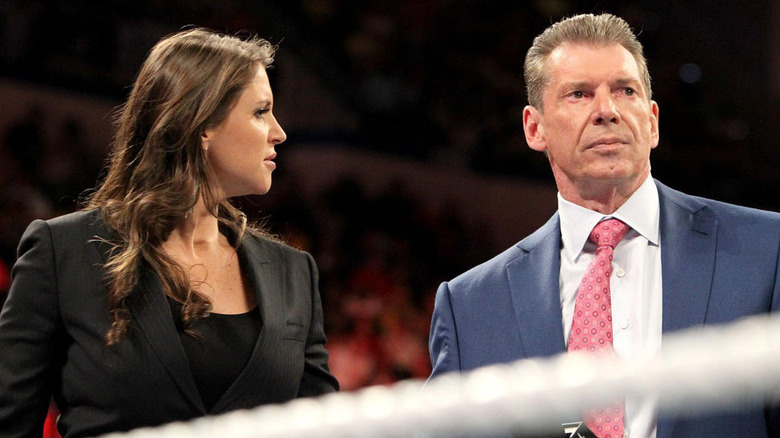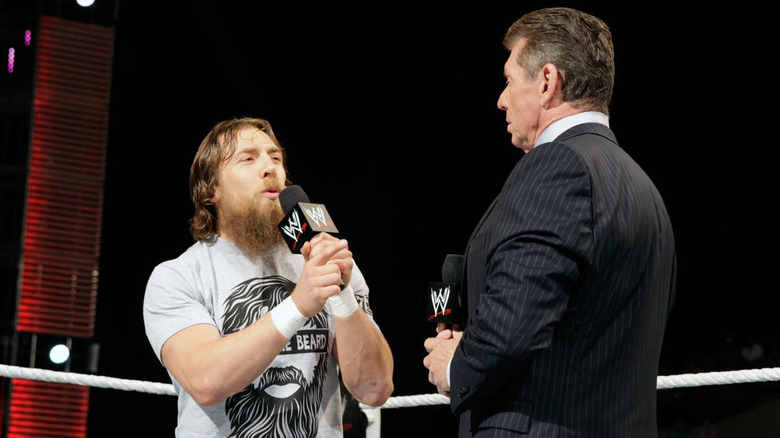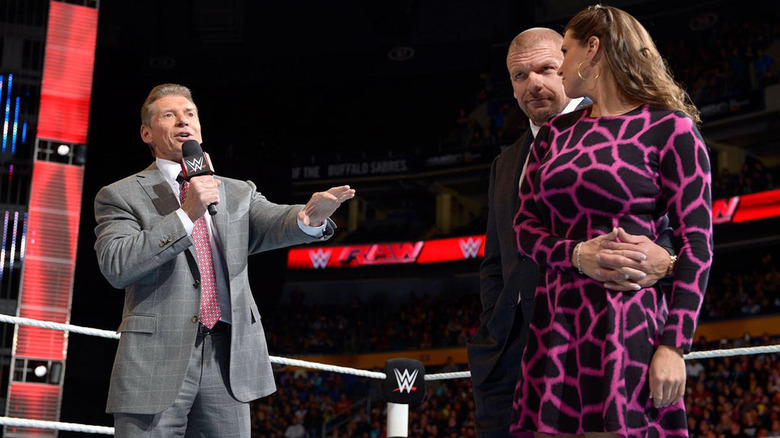Former WWE Writer/Producer Robert Karpeles Discusses Vince McMahon's Return, Possible Ramifications, & More! - Exclusive
To say it has been a hectic 24 hours of pro wrestling news would be an understatement. Vince McMahon has resumed his role as Executive Chairman of WWE, Stephanie McMahon has officially resigned as Co-CEO, and of course, WWE was reportedly being sold to the Saudis, before it wasn't.
Mere hours before everything in pro wrestling went catawampus, Wrestling Inc. Senior News Editor Nick Hausman sat down with former WWE writer and producer Robert Karpeles to look at his time working for the company, as well as its rapidly changing landscape. Karpales discussed what it was like to work with Stephanie McMahon as part of WWE creative, Vince McMahon's return to the board of directors, Vince possibly taking the company private, and more.
You may also recognize Karpeles as one of the co-hosts of the popular "Wrestle Roasts" podcast. Each week he joins comedians Mike Lawrence, Dan St. Germain and Scott Chaplin to talk the pro wrestling news of the week and roast some of the top names in the industry.
Joining The WWE Team
Nick: From your perspective, can you tell us what your role at WWE was while you were there?
Robert: Sure. So I had a couple different roles in the company. I started, like a lot of people there, you start as what they call an intern, even though you're not really an intern. It's sort of the entry level producer role within WWE 24/7, which was the precursor for the WWE Network. After a little bit of time there, a spot opened on the writing team and I was able to go and interview for that. Submitted a writing sample, interviewed with Stephanie, and with Michael Hayes, and Ed Koskey, and was brought on board on the creative team.
What was your first impression, like, of these people? You're sitting down, you're doing your interview. What did you make of these people the first time you met them?
So I mean, at least with meeting Stephanie, you're meeting someone who was a television character. She's a very important person in the company, obviously, but at the same time, it is someone you've seen on TV, you've played as a video game character. It's a recognizable figure. And within about a minute and a half, two minutes, she becomes an incredibly relatable, very, very nice person. We were arguing over who had the worst dorm room in college. So it was very weird. She was a fantastic boss who caught a lot of flack unnecessarily. I think just the nature of being in that role and that idea of, "Well, your last name is your last name and if you weren't here it would be," fill-in-the-blank. It would be Jim Cornette, it would be Paul Heyman, it would be Pat Patterson, whoever it is. She earned it and she worked very hard in that role.
And what exactly was her role in 2005, 2007?
So she was overseeing the creative team. All of our scripts, our pitches, our ideas, any of that got filtered up to her, and then she was very much the Vince whisperer. Vince was the person who had to stamp everything at the end. The idea was we'd meet with her, we'd pitch everything to Stephanie. Once she understands it gets on board with it, then ultimately when we do get that limited window of time with Vince, we can pitch it to him and we know that she has our full support on it.
TV Boot Camp
So you're writing, producing, right? Helping to bring the segments to life, everything like that. Who are some of the people you enjoyed working with?
I'm glad you used that, because bless his heart, our future Lord and Savior Tony Khan has a dislike of what he perceives as "WWE writers," which I think is something his product could definitely benefit from. And I think the more production people that go over from WWE there can talk to them about it. The idea of a writer in WWE is not, "I'm going to write out a nine-page soliloquy that I want Batista to go deliver on television." There's a small degree to that, but really you're given a grid and you're filling in the segments of the show, and you're building to a pay-per-view, and you are trying your best, in the Vince McMahon era, to say, "We have four weeks until No Mercy. We have this card. This card has been approved and is written in stone for now. We need to get there week one, two, three and four and map out how we're going to do that."
So I used to love when I would see all the criticism of, "there's no long-term booking, they don't know what they're doing." We try. You try to say, "here's where we're going to get to." When you get to TV, you are a producer in that you are running around with the script, wrangling talent, talking about what it is we're going to do, setting up the shot, getting the cameramen in place, getting the lighting in place and actually filming it. You are a writer/producer. There are production people who are on set, who are there, who are building the live show. But when it comes to the pre-tapes, when it comes to any of the vignettes, those are being done by people whose title is writer, but you really are a jack of all trades. And as a non-union company, that's part of the fun of it.
You are doing a little bit of everything. You may literally be physically helping to hold up lights or a boom mic while you're there. Whatever it takes to get something done, you learn. It's TV bootcamp. Anyone that works in television should have to do a stint in professional wrestling, because you can do anything after. I had to be an animal wrangler on one episode. We were in, I want to say it was Laredo, Texas. And the idea was JBL's limo could not come out in that building because it was a hockey rink and they were worried that the limo was going to break the ice. So we knew this in advance, so the idea was he was going to come out with a donkey, because he was feuding with Rey Mysterio, and he was going to be insensitive in a way you can't be in 2023.
So we had reached out to ... this guy Richie Posner ... anything you ask him to do, he's going to do and get for you. So we said, "Hey, we need a donkey." I get to the building, there's not one donkey waiting for me, there are three. And the animal wrangler is like, "Alright, which one do you want?" All of my decades of experience of how to pick the right camera-ready donkey. He's like, "Well, this one is too small. This one gets scared by loud noises." So based on the Goldilocks rule, all right, we found the donkey that's going on TV.
Memorable Days On The Job
We had to put together an exploding check that The Undertaker was going to strike with lightning. A giant Ed McMahon style check. I have no idea how we were going to do it, but I'm on the phone with the guy and I'm like, "Alright Richie, we need a check." He said, "What do you want the check to look like?" I'm not in graphics. I had to design the check that went on television that Randy Orton was going to give to The Undertaker that exploded. So it's a very all-encompassing kind of job ... My biggest, I guess, sort of tiny claim to fame, the one thing that I pitched that made it onto the air and stayed, was I loved working with the Mr. Kennedy character when it first started. And I pitched the idea of the microphone coming down from the ceiling, doing that old school Madison Square Garden look, incorporating that and getting to work with him on some of the verbiage for his promos. So that was a hell of a lot of fun. And then [I] was there for Bobby Lashley's debut, which happened sort of happenstance.
Vince saw him backstage. We were doing a birthday party for Pat Patterson and Lashley happened to have been there, and he's like, "God damn, we're putting that guy on TV tonight." Suddenly he's out there with Mike Bucci, with Simon Dean, and it was one of those times where I stood in the crowd because I wanted to hear the reaction for him. And they saw him, like, "Holy, that dude is huge." It was awesome. My last time within the company, I transitioned off the road but I knew I was leaving for law school, and worked in 24/7 being a lot more hands-on with creating content, because even back then we knew we're going to have a network someday. We didn't know what it was going to look like. We thought maybe they were going to buy the Tennis Channel. I think at one point that was talked about, it was something where there's going to be [an] over-the-air network.
So we're cleaning up all the TV, we're putting together shows ... We did "The Monday Night Wars" hosted by Michael Cole. So what we did — and this is years before Conrad — we aired that week's episode, head-to-head, of "Raw" and "Nitro," and you could compare. And with Cole doing interstitial programming before, during, and after. And it doesn't exist anywhere. The Network, they just didn't put it there. It's such easy content. And we would clean up all the "Nitros", clean up all the "Raws," remove any problematic music, clear out any bumper or commercial break issues, whatever that may be. And it was a lot of fun. And then my last project was the "Legends of Wrestling Round Table."
They were all smoking cigars and drinking whiskey, if I remember. I remember a couple of those back in the day.
So they were smoking cigars, they all had coffee mugs. There was not coffee in those mugs. However, we needed to kind of kayfabe it a little bit to make it seem like they're all just drinking coffee. And at one point Patterson asked for more coffee and a PA brought him coffee. And he was so pissed. "What the f*** is this?"
Working With And For Vince McMahon
Let's talk about Vince. What's your relationship like with Vince? What was it like working with Vince? Did you notice anything weird about him?
So Vince is, he's the last creative entity, I think, left alive who has had an impact on our childhoods. Jim Henson is dead, Walt Disney is dead, Stan Lee is dead. The last person who's created something that is this inescapable of childhood, of life, is Vince McMahon. He's that last singular creative force. All the IP that exists now is derivative IP of things that were created by people who are no longer here. So there is a little bit of a mysticism to him. And there really is that element of, you call him Vince. You go up, you introduce, and it's part of the shtick. You go up and shake his hand the first time and say, Mr. McMahon, nice to meet you. And it's, "Please, call me Vince." He's just one of the guys. He's one people in the group. That being said, when I tried talking college football with him at one point, blank stare.
I was going to Gainesville for a Gator game. I had mentioned it to him. I was talking about the Gators for a minute, and it's just not his thing. He lives 24/7 WWE. When he is in the room and you're pitching him, and it's a very long table, and all the "Raw" writers there and all the "SmackDown" writers are there, and Stephanie would be there, and Hunter would be there. There are moments where he's in it and he's following along with what's going on, and you're getting a lot of great feedback. There's minutes where you know he just came from a meeting about travel logistics and he has a meeting after this about budgeting for international touring, or whatever it is. You're trying to get that focus, but you know he's being pulled in eight different directions at once. And the fact that you're trapped in that room until he comes in for the meeting. That meeting may be set for 11:00 AM, You might not first see him till 7:30, 8:00 at night.
And you're just sitting there waiting. And it's fine, and it's what you do. And he'll come in, he'll eat this giant steak wrap that he would just bury in ketchup. No one else is eating. He's the only one eating. And he'd just sit there going to town on this thing. And it was just like a mound of steak, like an entire cow in a tortilla wrap, slathered in ketchup.
Lettuce, tomato, onions, anything like that, or just raw meat?
I didn't see a vegetable anywhere near that man. No.
Noted.
That and Muscle Milk. Loved Muscle Milk.
Hush Monies And Scandels
So when all of this news starts to break from The Wall Street Journal about hush monies and scandals, were you surprised when all of this started to come out, or no?
The weird word that comes to mind is "disappointed" .... When all of this stuff was going on for years and years with the #MeToo movement and all these powerful people being brought down, Vince's name is never really put out there for any of this. There hasn't been allegations against Vince in decades. And those allegations that existed in the past were, I'm going to assume, vetted and dismissed and whatever it is. But nothing was coming out. Nobody I worked with had anything negative to really say about Vince in any of those contexts. Maybe for all the bad things that you can say about Vince, and there's plenty, none of them rose to that level. It wasn't like he was engaging in some of the behavior you would see with a Harvey Weinstein or even a Jeff Zucker that brought those guys down. And you would've thought, "Alright, somebody at some point would've come out it, it didn't, maybe they're in the clear." As these things started to trickle out, it was separating "What did he do that was genuinely wrong" versus "What did he do that was potentially morally or ethically inappropriate?" ...
He was always open about extramarital affairs. It was a storyline multiple times that Jim Ross brought up on air when his character, talking about flaunting your affairs in Playboy. The onscreen stuff with Sable, the onscreen stuff that we did with Torrie Wilson and Candice Michelle, where it was kind of implied that there was something going on there. The stuff with Vince and Trish Stratus on air. He was never hiding any of it. So if he was having a legitimate extramarital affair with employees ... that may not, in and of itself, have been grounds to say he needs to be removed as CEO, or Chairman of the Board.
When it came out that he was paying them money to remain quiet, if that was his private money and he was having them sign NDAs ... that in and of itself might not be enough. If it was taking corporate money to pay those people, if it was promoting those people into higher, into better roles or giving them more money or anything like that, that's a level of quid pro quo that when you are an executive, yeah, the ceiling's going to come down on you. So seeing all that come out, I know enough about his mentality, it would be "Grit your teeth and get through it" ...
I didn't know what it was, unless it was, "Boy, there must be something really bad," like the other shoe was going to drop and this is going to end disastrously. And that other shoe never dropped. And I think him sitting at home stewing over it, he was probably legitimately upset. This was, in his mind, taken from him. He doesn't see he did anything necessarily wrong. That can be debated. I think that they investigated him and shareholders brought suits against him to reimburse for that investigation. And I think that lawsuit is going to hang over his head for a while because now there's other things being attached to that lawsuit as recently as today, so ... It's going to be troubling to see what winds up happening here. Him coming back in any capacity did not surprise me at all.
Would Vince McMahon Sell WWE?
So knowing what you know about how Vince, how it works, do you think he would actually sell the company,or do you think that's all a kind of facade? I think that's the question everyone's asking themselves right now.
I've always felt that you can't sell the WWE. And people have always looked at me kind of crazy about that. They are such a self-contained entity that any organization that's going to buy them, if it's an NBC Universal, if it's a Fox, Disney, there are so many tentacles, there are so many different elements to it that you're not just buying an intellectual property element. This isn't buying Marvel, and now you own these characters and you can go make movies in your studio. This isn't buying Star Wars, same kind of thing, where you can take that, and all right, maybe I can do something at an amusement park or whatever it is. You're buying a global live touring company that runs 52 weeks a year, two live television shows that are touring. One studio show. You're on the road running live events four, six times a week.
And having worked as an in-house counsel for an arena, for a professional sports team, and knowing what goes into that, Disney does "Disney on Ice." They work through Feld [Entertainment]. They do not run the same schedule as WWE does. They don't own the trucks. They don't own all of the equipment. They don't have to worry about maintenance and upkeep of rings, and lighting, and cameras, and TV trucks and making sure those are running, and an entire staff that's facilitating that. The sheer army of people who work for WWE, and the music department, the audio, the graphics, your merchandise, all of that is in-house. And that's before you even get to the creative end of it. Where you're putting on a live TV show every week. And one of Vince's best assets for the longest time has been deflecting any of those conversations about, "Are they independent contractors?"
As soon as that goes away from Vince in the Connecticut court system, and Jerry McDevitt, who's probably the greatest lawyer of all time ... he's amazing. And you're, let's say, Disney, do you now want to have to have that argument as to why you're not providing health insurance for these guys who are working for you 52 weeks a year? Do you want to have that fight and that argument? You very well might win on the same merits of Vince has won, but it could be an ugly conversation, as why are they not members of SAG but everybody else is members? They're opening a lot of conversations and doors that are going to be troublesome. And WWE succeeds because that is everyone's first priority and number one goal. If you're acquired by someone else, you might not be number one in the pecking order.
The Possibility WWE Goes Back To Being Private
So an acquisition you seem coy on. The other two options would be they remain public and continue on with a new round of TV rights negotiations, kind of business as usual as it's been for the last three years or so. Or something you brought up over on the "Wrestle Roasts" podcast when we were talking about this ... What are the benefits if Vince wants to take this company private? You had said that you'd been through the process of helping a company go from public to private. Walk me through how would that work, and how would that benefit or harm Vince McMahon if that happened?
So yes, they could remain public, they could go entirely private. The benefit of either of those are you're going to get a tremendous amount of money in your TV rights deals. And by not being owned by a singular entity, you are Switzerland. You can have a show on Fox, you can have a show on USA Network, and much like the NFL, you can promote on Fox, go watch this show that's going to be on NBC, or an NBC product. Go watch Peacock and they're advertising it on Fox. Kind of the same way if you watch an NFL game, they're going to tell you, alright, on the CBS show, "Hey, watch, ESPN tonight to watch the Sunday Night Football game." You have that kind of power to do so, whether you are public or you do in fact take it private.
If Vince takes it private, he keeps all that money. As the majority shareholder you do have to answer to a board, you have to answer to shareholders. If it's entirely private, you live and die on your own merits. And that's a man who believes in himself above anyone else. He is a man who beat Ted Turner. He beat the U.S. government. He beat every promoter. He thinks "I can take on the world and do this at 70-something years old." And if he can raise enough capital from bringing it private, maybe he's okay with that. Or maybe he's okay that if this thing ultimately fails, it's by my hand versus having to sit and watch someone else do it.
How do you feel about the fact that thousands of people's livelihoods here really kind of rest at the footsteps of this one guy who's kind of seemingly doing whatever he wants right now? It terrifies me a little bit. I don't know, it makes me feel unsettled. I don't know if I'm wrong to feel that way.
You are, because when I worked there, I worked with a lot of people who were not wrestling fans. A lot of people who outwardly either weren't fans or didn't like the product, but were either interested in production and were living in the northeast, and there was only a limited number of options, and this was major global television, or this is one of the largest employers in Connecticut that offered great benefits, great health insurance, competitive salary, and you're working for a major multinational corporation. So they all had faith in the sense that this is a television show that is consistently drawing high ratings, not only in the United States, but in 170 countries that was making additional revenues as one of the highest grossing live touring entities. At the time they were number one DVD sales. They had the consistent top 10 highest selling video game. There were toys in the stores.
Is Vince McMahon Good For WWE Business?
There was always money coming in no matter what Vince did. And Vince was never going to do something to truly kill the WWE. It was always in the best interest of the company. It was not his own personal vanity. And he always believed, right or wrong, and in my own personal opinion, sometimes more wrong than right, he was giving the audience what the audience wanted even if they didn't realize it. And his track record and picking guys, he tends to pick the right guy ... He has a good eye for talent. He generally has an idea for what the audience wants. It might not be the most popular thing, but I kind of liken it sometimes to how for years "NCIS" was the most popular show on television. I don't know a single person in my entire life who's watched an episode of "NCIS," but yet it was a ratings juggernaut. Raw is a ratings juggernaut in cable television, but for a long time it was not in vogue to talk about, but it was still generating money. And as long as you're bringing in money, that's kind of what you need if you're going to take it private, if you're going to maintain it public and keep the lights on.
So do you see Vince McMahon coming back as something good or bad for the company?
Both. I think if you take him at his word, at face value, and he says there is not going to be a new media rights deal without the guy who controls the majority of the shares of the company, there is not going to be a potential sale. We are not going to engage with JPMorgan Chase unless the guy who has the majority of voting power is part of it. It's almost like you're holding everyone else hostage.
Yes.
You're not going to come out and say that because that'll drive down the share price. Share price keeps going up because people are hoping, "Hey, if this thing sells, and this is one of the last IP properties out there, we're going to cash in." If he's coming in to just do that and see that this thing falls into the hands that will keep this thing going and not tarnish his legacy, then great. They've come out and said, "We support Nick Khan, we support Stephanie, we support Hunter," which you have to say because you can't project turmoil or conflict. The market hates any remote semblance of turmoil and conflict. And you have to hope that a lot of people on Wall Street are not sophisticated enough to understand that, what Vince is really looking to do.
Because there's that other side ... "This is mine. I don't care that this may tank the stock. I don't care that nobody will want to put us on." He's still the guy that put "SmackDown" on MyNetwork. That's the part that I always go back to. It was, "'SmackDown' is going to air somewhere, it's going to air on a network, and I don't care that it's not on CW. I don't care that it's going to be on MyNetwork." And he kept that thing going and now it's on Fox. And that's the one thing you look at more than anything else is, he took this thing from the fringes of fringe networks and put it on one of the big four on primetime. So he has faith in what he does and what he's able to deliver.
Potential WWE Creative Return Of Vince McMahon
You think he winds up back in a creative role? By the end of 2023, is Vince McMahon back in some kind of creative role with WWE?
I don't know officially if he would ever hang that title around his neck again. I think unofficially, if you think that he's not going to have a conversation with his son-in-law who has to answer to him in some capacity as a board member, you're kind of crazy. Hunter did everything he could to poke Vince. It was, "We're going to bring back sane wrestling on TV. We're going to let Michael Cole talk without someone in his ear. All these people you fired, we're bringing them all back." And it was just like, you could just feel Vince seething somewhere. And now he's back and it's like, "Oh s***." Kevin McCallister has to clean up the house before mom and dad get home, but you can't totally undo it. And I think there is a happy medium in place.
One would hope, Robert. All right, well we'll wrap it there for today. I'd love to bring you back, we'll talk more wrestling. I didn't even get to talk about your hyper popular @WWECreative_ish Twitter account, which is hysterical.
Yes.
You think like Vince sometimes. You write things like Vince McMahon on your Twitter and it's wonderful.
That's terrifying.
No, it's good. Good stuff. Anything you want to plug, promote, put over here before we wrap it up today?
Yes, you can follow me on Twitter @WWECreative_ish. The name was changed when WWE personally had my account shut down, in part because people in the production truck and Gorilla were following it. And then we had to specify it was a parody. And I am on a podcast called "Wrestle Roasts" with three incredibly talented professional comedians. Dan St. Germain, Mike Lawrence, and Scott Chaplin. We do roasts every other week of professional wrestlers. And the week that we don't do a roast, we do a breakdown of all the different things going on in wrestling in a really fun, funny way. It's a good time.
